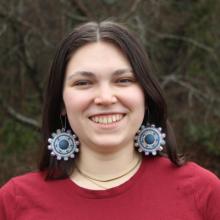Gracie Crafts
Why did you decide to pursue a graduate degree?
I am pursuing a graduate degree because I can see there is a gap within science and Indigenous knowledges. This is especially present in fire ecology research and the use of Indigenous Fire Stewardship. There are not many Indigenous female-identifying, two-spirit, and non-binary people working and researching fire ecology. There is some really important work and collaboration that can be done.
Why did you decide to study at UBC?
I decided to study at UBC because of the reputation of the UBC Faculty of Forestry. I heard about some really neat research that was happening at UBC. I also was able to find two women supervisors at UBC, one being Indigenous. It was important to me to be able to work with other women in STEM as well as being able to work with other Indigenous scholars.
What is it specifically, that your program offers, that attracted you?
Specifically, the MSc in Forestry offers amazing research and professional opportunities. This program allows you to experience different areas of forestry and how your research will fit into a job beyond your degree.
What was the best surprise about UBC or life in Vancouver?
The best surprise was how beautiful campus is! There are many locations across campus that are beautiful year round.
What aspects of your life or career before now have best prepared you for your UBC graduate program?
Before starting my MSc at UBC, previous jobs and my undergraduate program, Indigenous Environmental Science (BSc) prepared me best. They aided me in learning how to research and write scientific reports. Previous jobs have prepared me for field research, community outreach and public education aspects.
What do you like to do for fun or relaxation?
I spend a lot of time outside, hiking, running, walking, camping and exploring. I also enjoy baking and cooking.
What advice do you have for new graduate students?
My advice for new graduate students is to ask lots of questions and set up check ins with your supervisors or other faculty members that may be able to offer guidance.
Outside of your academic work, what are the ways that you engage with your local or global community? Are there projects in particular that you are proud of?
In 2018, I co-founded Georgian Bay Anishinaabek Youth (GBAY) with three other Anishinaabek (Ojibway) youth from the Eastern Georgian Bay region. We work in partnership with Georgian Bay Mnidoo Gamii Biosphere, a UNESCO World Biosphere. The foundation of our work is Anishinaabe aadziwin – cultural land-based learning to reconnect youth to their lands and culture through safe and meaningful ways. This is a grassroots organization is something I am very proud to be apart of as we engage daily with local community and youth. There is a clear positive impact that we have been able to make.
